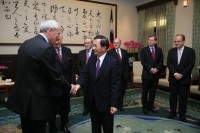President Chen Shui-bian Meets Visiting Delegation from Britain's RUSI

President Chen noted that the history of RUSI dates back over 170 years and that it serves as one of Britain's most influential defense and security think tanks. The president added that the organization has cooperated with Taiwan on a number of occasions throughout the years in jointly holding closed door roundtables, and that it is an outstanding platform for communications between the two countries. President Chen said RUSI has long paid close attention to the situation in the Taiwan Strait and has provided appropriate suggestions, making it a critical link in maintaining cross-strait peace and stability.
President Chen said that during the 18 years following the Tiananmen Incident, China's defense budget has increased by double digits annually. Over this period, China has refused to abandon its threat of military force against Taiwan, and in March 2005 Beijing passed the Anti-separation Law in order to establish a so-called legal basis to take military action against Taiwan. Intelligence information indicates that prior to 2007 China will have completed its emergency combat capability against Taiwan, and by 2010 it will have the ability to undertake a large-scale war with Taiwan. By 2015, China will have the ability to control the outcome of a conflict, marking the third stage in its three-phase agenda to ensure military preparedness against Taiwan. President Chen stressed the seriousness and gravity of the situation.
In recent years, some have proposed that the European Union lift its arms embargo against China. In response, President Chen said he hopes that the visiting experts and scholars will be able to use their influence to persuade EU nations not to rashly lift the ban. The lifting of the ban would be tantamount to selling weaponry to a non-democratic China that could use the arms against a democratic Taiwan, he said.
One member of the visiting delegation, General Richard Cobbold, said that RUSI is an independent think tank that is not overseen by the British government, enabling it to objectively express its views. General Cobbold said that in the past, RUSI and the Taiwan government have maintained close contact, from which it has obtained valuable information. He said he is pleased that the research and suggestions of his institution have made a contribution to maintaining peace in the Taiwan Strait.
General Cobbold added that while EU nations are still debating whether the ban on arms sales to China should be lifted, most people agree that a lifting of the embargo would constitute a critical error. Extremely careful consideration must be made before any decision is made, he said. General Cobbold furthermore said he believes that a decision to lift the ban will not be made in the near term. He also said that his organization will continue to do its utmost to maintain peace in the Taiwan Strait.